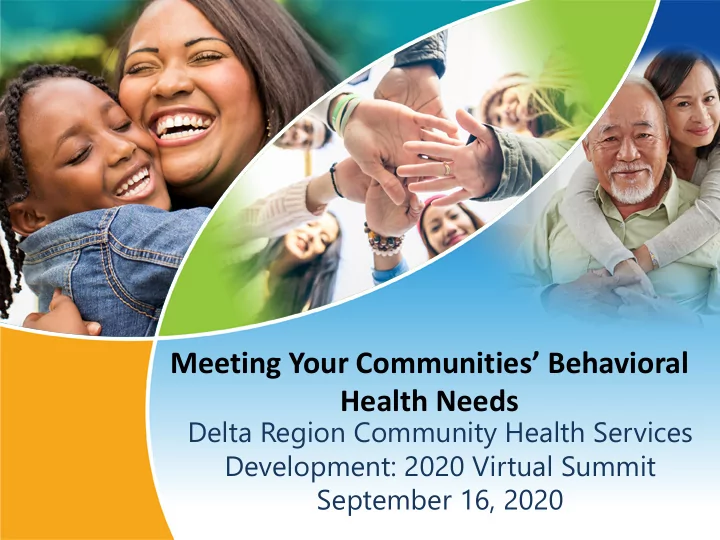

Meeting Your Communities’ Behavioral Health Needs Delta Region Community Health Services Development: 2020 Virtual Summit September 16, 2020
Objectives • Learn about the mental health ecosystem and collaborative care • Learn how to engage family members as partners in collaborative care • Learn about no-cost peer support
What is NAMI?
What does NAMI do?
What makes NAMI different?
NAMI’s Approach Mental health conditions are no one’s fault Catastrophic stressors Bio-Psycho-Social Model Collaborative care
Collaborative Care
STAGES of Treatment Adherence
Wheel of Care Coordination
Crisis Care
Inpatient Care
Outpatient Care
Social Support
Peer/Family Support and Care Coordination Peer and Family Supports Care Coordination
SELF-CARE for family members
FEELINGS Reported by Family Members as REACTIONS to a Loved One’s Mental Health Condition DENIAL DISRUPTION CONFUSION OF FAMILY RELATIONSHIPS GRIEF FEAR ISOLATION FRUSTRATION SLEEPLESSNESS APPREHENSION SORROW GUILT ABOUT THE FAMILY EXHAUSTION OF SPIRIT & ANGER RESOURCES DIFFICULTY ACCEPTING DEPRESSION RAGE THE CONDITION SHAME
STAGES of Emotional Reaction DEALING WITH CATASTROPHIC EVENTS Crisis, chaos, shock, denial, hoping against hope LEARNING TO COPE Anger, guilt, resentment, recognition, grief MOVING INTO ADVOCACY Understanding, acceptance, advocacy, action
Important Points about the STAGES None of these stages are “wrong” or “bad” This process is ongoing - for most of us it takes years to navigate Different family members are often at different places in the cycle This cyclical process is not about expectations With time, you will begin to recognize these stages and emotional reactions
MISINTERPRETATIONS of Natural Reactions to Trauma Natural trauma response In family, response may be In individual, response may people have viewed as be viewed as Shut down Withholding, cold Uncommunicative Demanding, unreasonable Out of control Angry Disinterested, aloof Fragile Dazed Worried Enmeshed Bothersome Blaming others Dysfunctional Irresponsible Something to hide Lacks motivation Withdraws They’re the real problem Uncooperative Cuts off contact
SECONDARY TRAUMAS for Families OVERWHELMING RESPONSIBILITY Families assume overwhelming FEEL responsibility CONFINED Families feel confined Families remain uninformed UNINFORMED Families are emotionally exhausted EMOTIONALLY Families find inadequate support EXHAUSTED INADEQUATE SUPPORT
Secondary Traumas for the Person in RECOVERY Making treatment decisions Medication side effects Self-harm Co-occurring mental health condition and substance abuse Criminalization
BURNOUT is not just for professionals • Emotional and physical exhaustion • Emotional stress • Absenteeism; decline in performance • Increased escape behaviors • Lowered self-regard
Self-Care
DIAPHRAGMATIC breathing
Setting LIMITS
Empathy
Empathic GUIDELINES
Basic Communication GUIDELINES Use short, clear, direct sentences Keep the content simple Do what you can to keep the stimulation level as low as possible If your loved one appears withdrawn and uncommunicative, back off for a while Assume that much of what you say may not be heard the first time Be pleasant and firm Communications form our boundaries with others; make sure your boundaries are sturdy and clear
I – Statements • I am speaking in a very specific, direct manner • I am at the center of the communication • I take complete responsibility for my feelings and opinions • I don’t waver • I say what I mean Example: “I don’t like it when there’s smoking in the house.”
YOU – Statements When we move away from I-Statements with our loved one, we tend to: • Feel defensive • Blame and become judgmental • Make assumptions about the other person’s motives • Generalize a specific problem to other situations and accusations begin to snowball • Vent our negative feelings
Sustaining POSITIVE Outcomes Reduced Improved family stress coping Improved problem solving skills Increased knowledge Increased help-seeking Changed behaviors attitudes toward mental Empowerment health
Presentations, support groups, classes
IMPACT of NAMI Programs
What’s NEXT? www.nami.org
CALL THE NAMI HELPLINE 800-950-NAMI info@nami.org M-F, 10 AM - 6 PM ET OR TEXT "NAMI" TO 741741
Remember
Acknowledgements Photos & Stock Art Images used were purchased under a license agreement with iStockPhoto.com. These images can be used only by NAMI within the context of this project and it’s various materials. For information regarding the license agreement and restrictions, visit: www.istockphoto.com/help/licenses Any other images are the exclusive property of NAMI.
Recommend
More recommend